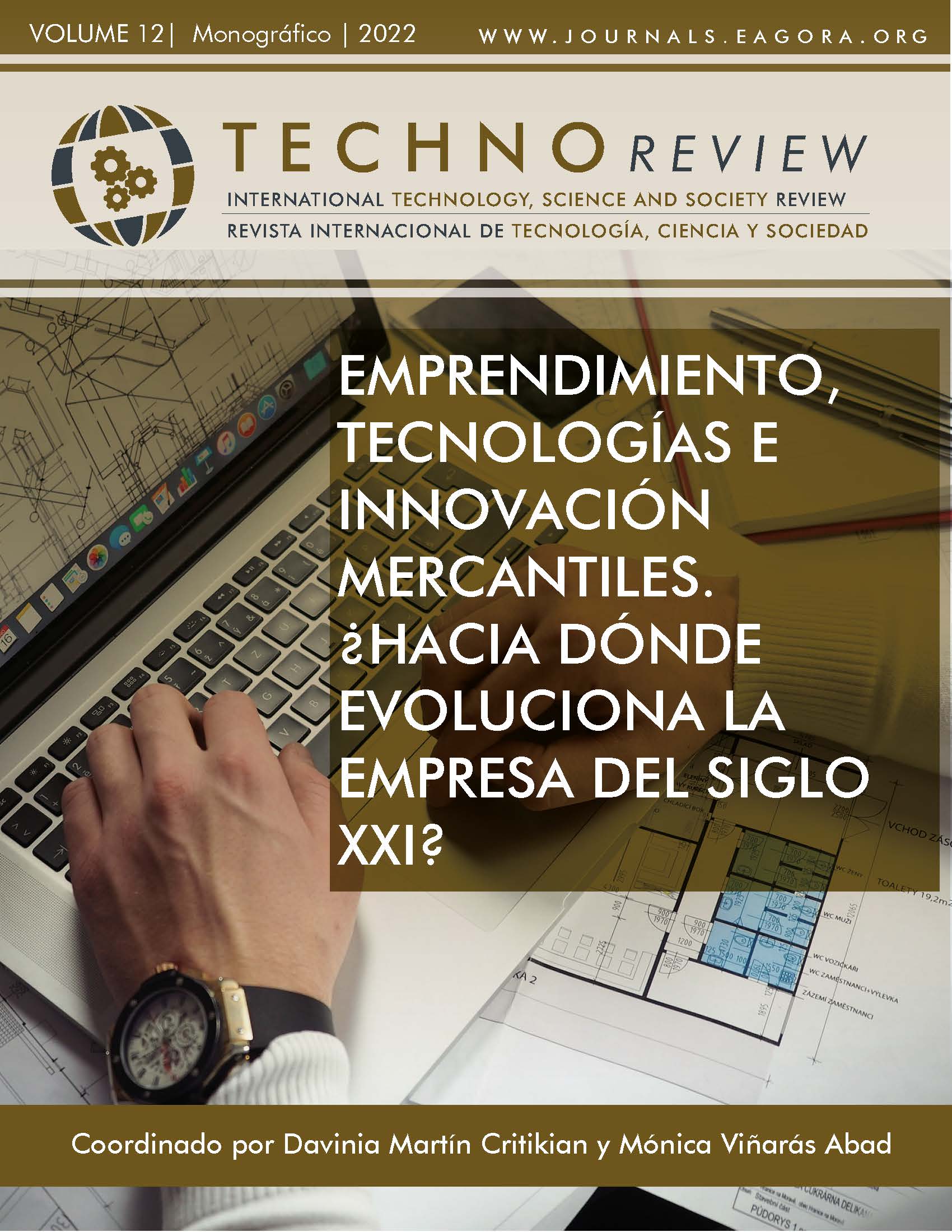Entrepreneurial skills to foster the employability of civil engineering students
DOI:
https://doi.org/10.37467/revtechno.v11.4485Keywords:
Active Learning, Entrepreneurship, Soft skills, Start-up, Civil engineering, Employability, Self-employmentAbstract
Nowadays, recent graduates of civil engineering have problems finding their first employment despite the requirements of the degree. Creativity, collaboration and emotional intelligence are essential soft skills needed. Unfortunately, none of them appears in the civil engineering curriculum. This work proposes to conduct the creation of small cooperative teams of students to tackle different challenges. The collaborative resolution of problems from real-life situations and the presentation of the results is the key to the holistic development of future professionals. This research has shown the need for the development of soft skills to promote entrepreneurship and self-employment as job opportunities.
References
Arriaga, J., Ortega, M. G., Meza, G., Huichán, F., Juárez, E., Rodríguez, A., & Cruz, S. (2006). Análisis conceptual del aprendizaje observacional y la imitación a conceptual. Revista latinoamericana de psicología, 38(1), 87- 102.
Bandura, A. (1987). Teoría del aprendizaje social. Espasa-Calpe.
Caicedo, G. R., Quintero, L., Peralta, V. P., & Rodríguez, A. N. J. R. e. y. d. s. (2016). Estrategias para el fomento de la cultura de emprendimiento universidades de Valledupar, Colombia. 10(1), 38-57. https://doi.org/ https://doi.org/10.18359/reds.1448
Carayol, N. (2003). Objectives, agreements and matching in science–industry collaborations: reassembling the pieces of the puzzle. Journal Research Policy, 32(6), 887-908. https://doi.org/https://doi.org/10.1016/ S0048-7333(02)00108-7 DOI: https://doi.org/10.1016/S0048-7333(02)00108-7
Chatterton, P., & Goddard, J. J. E. J. o. E. (2000). The response of higher education institutions to regional needs. DOI: https://doi.org/10.1111/1467-3435.00041
(4), 475-496.
Chiu, R. (2013). Entrepreneurship education in the Nordic countries – strategy implementation and good practices.
Nordic Council of Ministers. http://urn.kb.se/resolve?urn=urn:nbn:se:norden:org:diva-2877
Davey, T., Hannon, P., & Penaluna, A. (2016). Entrepreneurship education and the role of universities in entrepreneurship:Introduction to the special issue. 30(3), 171-182. https://doi. org/10.1177/0950422216656699 DOI: https://doi.org/10.1177/0950422216656699
Davey, T., Plewa, C., & Struwig, M. (2011). Entrepreneurship perceptions and career intentions of international students. Education + Training, 53(5), 335-352. https://doi.org/10.1108/00400911111147677 DOI: https://doi.org/10.1108/00400911111147677
de Haro, J. M., Pozo-Rico, T., Mira Galvañ, M. J., Andreu, E., Gilar-Corbi, R., Corral-Granados, A., . . . Castejón, J. L. (2019). Desarrollo de competencias de innovación para el fomento del espíritu emprendedor en estudiantes de educación superior. In R. c. Roig-Vila (Ed.), Memorias del Programa de Redes-I3CE de calidad, innovación e investigación en docencia universitaria. Convocatoria 2018-19 (pp. 1253-1275). Institut de Ciències de l’Educació (ICE) de la Universitat d’Alacant.
Garcia-Barba, J., Cano, M., Tomás, R., Ivorra, S., Neipp, C., Reyes, J. A., . . . Soriano-Vicedo, J. (2020). Criterios de diseño para la mejora de la docencia en el Máster en Ingeniería de Caminos, Canales y Puertos a partir de encuestas de empleabilidad sobre los egresados. In R. c. Roig-Vila (Ed.), Memorias del Programa de Redes-I3CE de calidad, innovación e investigación en docencia universitaria. Convocatoria 2019-20 (pp. 635-643). Institut de Ciències de l’Educació (ICE) de la Universitat d’Alacant.
Gibb, A., Haskins, G., & Robertson, I. (2013). Leading the Entrepreneurial University: Meeting the Entrepreneurial Development Needs of Higher Education Institutions. In A. Altmann & B. Ebersberger (Eds.), Universities in Change: Managing Higher Education Institutions in the Age of Globalization (pp. 9-45). Springer New York. https://doi.org/10.1007/978-1-4614-4590-6_2 DOI: https://doi.org/10.1007/978-1-4614-4590-6_2
Goldfarb, B. (2008). The effect of government contracting on academic research: Does the source of funding affect scientific output? Research policy, 37(1), 41-58. https://doi.org/https://doi.org/10.1016/j. respol.2007.07.011 DOI: https://doi.org/10.1016/j.respol.2007.07.011
Guerrero, M., Urbano, D., Ramos, A. R., Ruiz-Navarro, J., Neira, I., & Fernández-Laviada, A. (2015). Observatorio de emprendimiento universitario en España. In: Edición.
Guimón, J. (2013). Promoting university-industry collaboration in developing countries. World Bank Policy Brief, 3, 12-48.
Jones, P. (2014). Entrepreneurship education: A recipe for change? %J The International Journal of Management Education (Vol. 12). Elsevier. https://doi.org/http://dx.doi.org/10.1016/j.ijme.2014.09.004 DOI: https://doi.org/10.1016/j.ijme.2014.09.004
Lăcătuş, M. L., & Stăiculescu, C. (2016). Entrepreneurship in Education. International conference KNOWLEDGE- BASED ORGANIZATION, 22(2), 438-443. DOI: https://doi.org/10.1515/kbo-2016-0075
Levratto, N. (2013). From failure to corporate bankruptcy: a review. Journal of Innovation and Entrepreneurship, 2(1), 20. https://doi.org/10.1186/2192-5372-2-20 DOI: https://doi.org/10.1186/2192-5372-2-20
Matlay, H. (2008). The impact of entrepreneurship education on entrepreneurial outcomes. Journal of Small Business and Enterprise Development, 15(2), 382-396. DOI: https://doi.org/10.1108/14626000810871745
Osorio, L. A., & Duart, J. M. (2011). Análisis de la interacción en ambientes híbridos de aprendizaje Comunicar, 37(19), 65-72. DOI: https://doi.org/10.3916/C37-2011-02-06
Sánchez Espada, J., Martín López, S., Bel Durán, P., & Lejarriaga Pérez de las Vacas, G. J. E. (2019). Educación y formación en emprendimiento social: características y creación de valor social sostenible en proyectos de emprendimiento social. 8, 38. https://doi.org/https://eprints.ucm.es/cgi/export/50863 DOI: https://doi.org/10.5209/REVE.62492
Savanevičienė, A., Stukaitė, D., & Šilingienė, V. (2008). Development of strategic individual competences.
Engineering economics, 58(3).
Shane, S., & Venkataraman, S. (2003). Guest editors’ introduction to the special issue on technology entrepreneurship. Research policy, 32(2), 181-184. https://doi.org/https://doi.org/10.1016/S0048- 7333(02)00104-X DOI: https://doi.org/10.1016/S0048-7333(02)00104-X
Timmons, S. (2003). Nurses resisting information technology. Nursing inquiry, 10(4), 257-269. DOI: https://doi.org/10.1046/j.1440-1800.2003.00177.x
Velasco Martínez, L. C., Estrada Vidal, L. I., Pabón Figueras, M., & Tójar Hurtado, J. C. (2019). Evaluar y promover las competencias para el emprendimiento social en las asignaturas universitarias. https://doi.org/https:// doi.org/10.5209/REVE.63561 DOI: https://doi.org/10.5209/REVE.63561
Viloria, H. J. (2017). Desarrollo de competencias emprendedoras en docentes de universidades públicas autónomas. 15(1), 133-146. https://doi.org/https://doi.org/10.15665/re.v15i1.815 DOI: https://doi.org/10.15665/re.v15i1.815
Weber, R. (2012). Evaluating Entrepreneurship Education. Gabler Verlag. DOI: https://doi.org/10.1007/978-3-8349-3654-7
Zahra, S. A. (2007). Contextualizing theory building in entrepreneurship research. Journal of Business Venturing, 22(3), 443-452. https://doi.org/https://doi.org/10.1016/j.jbusvent.2006.04.007 DOI: https://doi.org/10.1016/j.jbusvent.2006.04.007
Downloads
Published
How to Cite
Issue
Section
License
Those authors who publish in this journal accept the following terms:
- Authors will keep the moral right of the work and they will transfer the commercial rights.
- After 1 year from publication, the work shall thereafter be open access online on our website, but will retain copyright.
- In the event that the authors wish to assign an Creative Commons (CC) license, they may request it by writing to publishing@eagora.org








